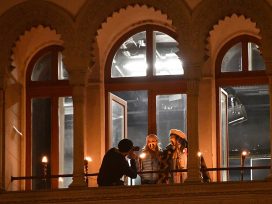86 articles

The 20th century model of education promised a path for talent to rise through the ranks and for everyone else to find their place in society on the labour markets. But decades of research have confirmed what many found through their own experiences: that this promise was never fulfilled. The COVID-19 pandemic has further exacerbated already existing problems and it may be just the opening act of much deeper crises.
It is clear that there isn’t an old educational normal to return to; the old ways were clearly flawed. But how to go forward? In this focal point, initiated by our partner journal La Revue nouvelle, we look into matters of access and inequality, concerns about labour markets and the rapidly changing knowledge production, to map the factors that could inform a better design for our schools.

Strategies for addressing unemployment rates often involve reforms in higher education. Yet bridging the perceived gap creates its own deprivations. Analysing discourse and policy in the European context points to a strong neoliberal agenda behind labour market-oriented changes at universities.

Disengagement from learning, social injustice, mental health issues, identity tensions – the COVID-19 pandemic has exacerbated many problems in schools. How can the education system now kick-start recovery instead of acting as a millstone?

Attacks on academic freedom in Hungary are rife: the Central European University and the Hungarian Academy of Sciences being recent victims. But what does ‘freedom’ mean in a country with such a short history of democracy as Hungary? And how is the situation in post-Brexit UK different?

Oppressed people who retaliate are up against the privileged and powerful. Fighting back often places them outside the system. But what happens when the suppressors’ tools are turned on themselves? Can a colonial education – the underhand offer of ‘a pencil for land’ — be turned into an emancipatory counter movement?

The rapid dismay of Hungarian universities has upset international observers recently. However, the illiberal vanguard state doesn’t hold a monopoly on academic pressure. In this conversation, Hungarian critic Anna Gács and German historian Barbara Stollberg-Rilinger discuss political interventions, cancelling and more.

Faced with government inaction on climate change, young people are increasingly engaging in civil disobedience. For those as yet unable to vote, the act of collectively removing the French president’s portraits from town halls is strikingly symbolic. Are such interventions a youthful rejection of politics or a new form of civic engagement?

Interactive education has become essential in the classroom. But didactic teaching methods seem to have resurfaced through interactive media delivery. The consequent loss of engagement affects attendance: data suggests that almost a third of Italian pupils have disappeared from lessons during the COVID-19 pandemic.
The meritocratic premise of modern schooling serves merely to reproduce inequalities. In order to prepare young people for the challenges of the twenty-first century, the purpose of schooling must be fundamentally rethought. Green European Journal talks to political scientist Edouard Gaudot.
It took a while for even the faculty to realize that the Istanbul Şehir University has effectively been closed down. It had stood its ground against Erdoğan’s interventions for years, but the pandemic served as the perfect opportunity for a swift and silent takeover. Now the same can happen to any of the other independent universities in Turkey.
Education under neoliberalism – a contradictory mix of competition and austerity promoting vaulted excellence over grounded learning. Cornelia Klinger highlights awards ceremonies appropriating the names of famous historic achievers as prime example of capitalist commodification masking old and new sociopolitical inequality and injustice.



